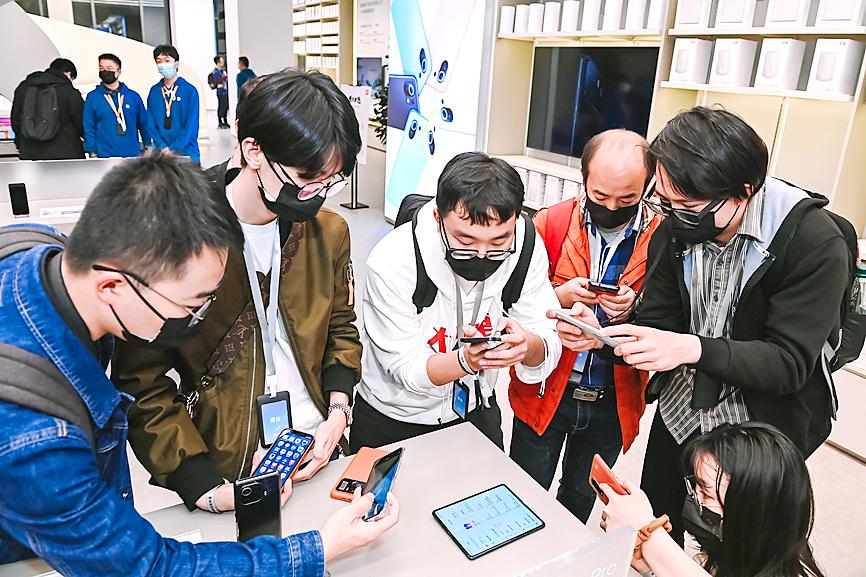Mobile phone giant Xiaomi Corp (小米) is among investors considering joining a funding round of at least 1.5 billion yuan (US$231 million) for Black Sesame Technologies Inc (上海黑芝麻智能科技), people familiar with the matter said.
The fundraising would value the Shanghai-headquartered artificial intelligence (AI) and autonomous driving chipmaker at as much as US$1.5 billion, the people said, asking not to be identified as the matter is private.
Black Sesame’s backers in its previous funding round included Tencent Holdings Ltd (騰訊), one of the people said.

Photo: EPA-EFE
Black Sesame is considering an initial public offering (IPO) on China’s technology-focused Shanghai Star board (上海證券交易科創板) as soon as next year, the people said.
At least one more round of investment is planned before any potential IPO, they said.
Xiaomi has invested billions in scores of start-ups to build out its smartphone and online ecosystem, but a deal with Black Sesame would mark the company’s latest bet on the automotive arena since announcing a US$10 billion plan to build electric vehicles.
The start-up, which designs AI chips and systems for vehicles, counts major auto industry firms, including Robert Bosch GmbH, SAIC Motor Corp (上汽集團) and BYD Co (比亞迪) among its clients, information on its Web site said.
Details of the fundraising, such as size and valuation, could change, the people said, while discussions of the IPO are at an early stage and the company could decide not to pursue a listing.
The investment talks come as Xiaomi plans to invest US$10 billion over the next decade into manufacturing electric vehicles, its billionaire cofounder Lei Jun (雷軍) announced last month.
The Chinese smartphone maker joins tech giants from Apple Inc to Huawei Technologies Co (華為) in targeting the vehicle industry, betting future vehicles would grow increasingly autonomous and connected.
Xiaomi plans to outsource auto assembly to contract manufacturers, a model it uses for its smartphones, a person familiar with the matter has said.
Founded in 2016, Black Sesame is an AI company focused on image processing, perception algorithms and system-on-a-chip design, its Web site said.
It has about 300 employees, 80 percent of whom work in research and development, the site showed.
The start-up is one of a growing number of Chinese chipmakers and tech giants seeking capital to develop semiconductors used to train AI algorithms.
AI chip companies in China, such as Beijing Horizon Robotics Technology Co (北京地平線機器人技術研發) and Enflame Technology (燧原科技), raised US$1.2 billion in the first quarter alone, BNEF estimates.

CAUTIOUS RECOVERY: While the manufacturing sector returned to growth amid the US-China trade truce, firms remain wary as uncertainty clouds the outlook, the CIER said The local manufacturing sector returned to expansion last month, as the official purchasing managers’ index (PMI) rose 2.1 points to 51.0, driven by a temporary easing in US-China trade tensions, the Chung-Hua Institution for Economic Research (CIER, 中華經濟研究院) said yesterday. The PMI gauges the health of the manufacturing industry, with readings above 50 indicating expansion and those below 50 signaling contraction. “Firms are not as pessimistic as they were in April, but they remain far from optimistic,” CIER president Lien Hsien-ming (連賢明) said at a news conference. The full impact of US tariff decisions is unlikely to become clear until later this month

Popular vape brands such as Geek Bar might get more expensive in the US — if you can find them at all. Shipments of vapes from China to the US ground to a near halt last month from a year ago, official data showed, hit by US President Donald Trump’s tariffs and a crackdown on unauthorized e-cigarettes in the world’s biggest market for smoking alternatives. That includes Geek Bar, a brand of flavored vapes that is not authorized to sell in the US, but which had been widely available due to porous import controls. One retailer, who asked not to be named, because

CHIP DUTIES: TSMC said it voiced its concerns to Washington about tariffs, telling the US commerce department that it wants ‘fair treatment’ to protect its competitiveness Taiwan Semiconductor Manufacturing Co (TSMC, 台積電) yesterday reiterated robust business prospects for this year as strong artificial intelligence (AI) chip demand from Nvidia Corp and other customers would absorb the impacts of US tariffs. “The impact of tariffs would be indirect, as the custom tax is the importers’ responsibility, not the exporters,” TSMC chairman and chief executive officer C.C. Wei (魏哲家) said at the chipmaker’s annual shareholders’ meeting in Hsinchu City. TSMC’s business could be affected if people become reluctant to buy electronics due to inflated prices, Wei said. In addition, the chipmaker has voiced its concern to the US Department of Commerce

STILL LOADED: Last year’s richest person, Quanta Computer Inc chairman Barry Lam, dropped to second place despite an 8 percent increase in his wealth to US$12.6 billion Staff writer, with CNA Daniel Tsai (蔡明忠) and Richard Tsai (蔡明興), the brothers who run Fubon Group (富邦集團), topped the Forbes list of Taiwan’s 50 richest people this year, released on Wednesday in New York. The magazine said that a stronger New Taiwan dollar pushed the combined wealth of Taiwan’s 50 richest people up 13 percent, from US$174 billion to US$197 billion, with 36 of the people on the list seeing their wealth increase. That came as Taiwan’s economy grew 4.6 percent last year, its fastest pace in three years, driven by the strong performance of the semiconductor industry, the magazine said. The Tsai